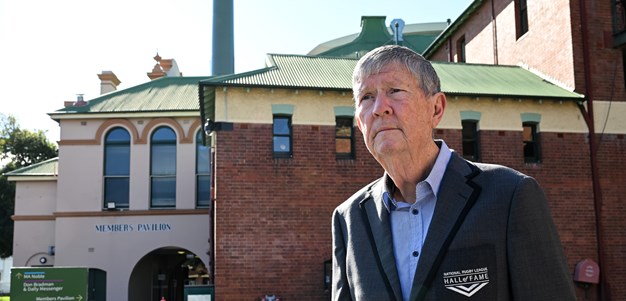St George Illawarra’s playmakers were quick to point out the genius of their plan to kick the ball dead rather than into the waiting arms of Jarryd Hayne on Friday night, but Parramatta coach Daniel Anderson insists the tactic will have little impact on his star fullback in 2010.<br><br>Dragons five-eighth Jamie Soward and hooker Nathan Fien combined to kick the ball dead on four separate occasions at Parramatta Stadium in an attempt to counter the new ‘downtown’ rule aimed at providing more space for the NRL’s top fullbacks.<br><br>But Anderson today played down the effectiveness of the Dragons’ tactics.<br><br>“I didn’t think it had a huge impact on the game to be honest,” Anderson said. <br><br>“Whether or not sides try to do the same again in the future, I don’t know, but it’s not something I’m worried about.<br><br>“It wasn’t the difference between the two sides.”<br><br>The ‘downtown’ rule, which penalises players for jumping the gun and racing downfield before a clearing kick is put in, was expected to see the likes of Hayne, Billy Slater and Brett Stewart run riot – but already teams have devised methods to counter their effectiveness.<br><br>For the Dragons, that meant booting the ball dead while Parramatta preferred to kick the ball long and high, allowing their chasers more time to make up ground.<br><br>“It’s something we need to do a bit more work on, not just with Jarryd but with all of our kickers,” Anderson explained.<br><br>“You really just have to be disciplined and not give penalties away.<br><br>“We have spoken about that over the past few weeks and we’ll continue to address it.”<br><br>The general consensus after the weekend’s action is that the new rule has had little significant impact on sides’ last-tackle plays, with most teams easily adapting their kick-chase games.<br><br>“It wasn’t much of an issue for us,” Penrith coach Matthew Elliott said of his side’s opening round win over Canberra on Saturday night.<br><br>“Both of our teams had kickers that kick over the yard line and we had enough notice about it so we talked about it and put in the practice to make sure it wasn’t an issue.<br><br>“Most players and coaches are pretty smart these days and they don’t want to give away penalties, so they adjust pretty quickly.”<br><br>However, opinion remains divided over the benefits of the rule, with Gold Coast halfback Scott Prince pleading with referees to not over-officiate in the early rounds.<br><br>Prince said most sides had struggled to adjust during pre-season trials and admitted concern that 50-50 decisions could determine the results of games as the season progresses.<br><br>“It’s something that has been part of our game for so long and then they throw this new rule in – it’s going to take time for the players to get used to it,” he said.<br><br>“Through the trials I thought the referees were a little bit harsh. <br><br>“I think it’s important that they warn the players first.<br><br>“As long as they say ‘Luke Bailey you’re offside’ and let him pull out, then I don’t have a problem with the rule.<br><br>“At the moment it’s too early for me to give any real opinion but during the trials I really didn’t like it because they were blowing penalties without ever warning the player.<br><br>“It’s something that could really turn a game.”<br><br>Prince said that the rule would have little impact on most kickers but would inevitably make life more difficult for sides with big forward packs.<br><br>“All I have to do is kick the ball and find some turf, so it doesn’t really affect me as such,” he said.<br><br>“It’s more a problem for the forwards who work their butts off for six tackles and all they want to do is get down-field as quickly as possible.<br><br>“They’re not actually sprinting down, they just want to get a head start.”<br>
You have skipped the navigation, tab for page content

National Rugby League respects and honours the Traditional Custodians of the land and pay our respects to their Elders past, present and future. We acknowledge the stories, traditions and living cultures of Aboriginal and Torres Strait Islander peoples on the lands we meet, gather and play on.

